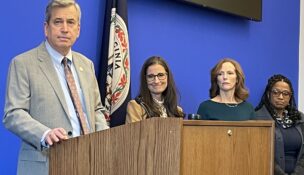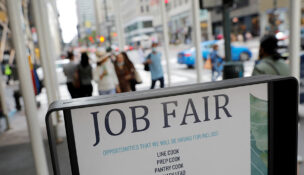Va. bankers say they’re not worried by SVB collapse
Some banks saw stock prices fall in response to crisis, though
Kate Andrews //March 13, 2023//
Va. bankers say they’re not worried by SVB collapse
Some banks saw stock prices fall in response to crisis, though
Kate Andrews //March 13, 2023//
Last weekend was pretty tense for bankers, even for those leading institutions quite distant and different from Silicon Valley Bank, which Friday became the second largest bank to fail in U.S. history. Federal regulators shut down SVB after a run on the bank. By Sunday, regulators also shut down New York’s Signature Bank, which became the third biggest bank ever to fail in the United States.
As word spread about SVB customers pulling out their money due to fears the FDIC would back only $250,000 per account, stocks dropped for banks everywhere, including in Virginia. “Friday, all banks got painted with the brush of fear,” Rex Smith, United Bank‘s Central Virginia regional president, said Monday. “It was a lot of fear and misinformation and lack of information.”
United Bank’s stock rebounded a bit on Monday, as people learned more about what happened at SVB, which had $209 billion in total assets in December and was a major backer of venture capital-backed tech startups. According to NPR, 90% of SVB’s deposits were above the federal insurance cap of $250,000, and VC investor Peter Thiel’s Founders Fund members withdrew millions from the bank, leading to what Judy Gavant, chief financial officer of Blue Ridge Bankshares Inc., called “just one of those old-fashioned runs on the bank.” SVB investors and depositors attempted to remove $42 billion from the bank on Thursday alone, said a California state regulator.
On Sunday and Monday, the White House and federal regulators took emergency steps to ensure that SVB and Signature Bank customers will have access to their deposits, which helped calm fears among startup entrepreneurs and their funders. U.S. Treasury Secretary Janet Yellen and President Joe Biden both emphasized that taxpayers would not be on the hook for reimbursing SVB and Signature account holders, with the money coming from the FDIC’s Deposit Insurance Fund, which banks pay into.
Biden also said that the bank executives responsible would be fired and that the banks’ investors would not be bailed out. “They knowingly took a risk and when the risk didn’t pay off, the investors lose their money. That’s how capitalism works,” Biden said during a Monday morning address from the White House.
Furthermore, in a move designed to prevent more bank runs, the federal government announced it had also initiated backstop measures to protect the entire nation’s banking deposits, safeguarding banks from $300 billion in securities losses.
Banks everywhere still suffered some financial fallout from the banking crisis, however, as investors sold off banking shares and sought safety in gold and Treasurys, kicking off the largest drop in regional bank stocks in three years.
And Virginia was no exception. Blue Ridge Bank, based in Charlottesville, saw its stock drop 8.97% Monday, and Fairfax-based FVCbank’s stock fell 11%. Share prices for Richmond’s Atlantic Union Bank, the largest regional bank headquartered in Virginia, with 2022 deposits of $15.7 billion, fell by 6.69% to $33.74 Monday.
However, the “unique risk factors” that affected SVB are not issues likely to impact the community and midsize banks here in Virginia, said Andy Farmer, spokesman for the Virginia State Corporation Commission, which regulates the commonwealth’s 47 state-chartered banks. “Virginia’s banking industry remains strong and well-capitalized.”
Atlantic Union CEO John Asbury noted the difference between his bank and the two that were shut down last week: “These are nontraditional banks engaged in nontraditional activities that grew rapidly. We are a full-service traditional banking facility.” Silicon Valley Bank, he said, was started to serve tech startups backed by venture capital firms. However, venture capital funding and loans for tech startups started to dry up in the past year, leading the startups to seek more withdrawals from the bank, Asbury said. SVB was invested heavily in long-term securities that weren’t liquid, though, and when the bank couldn’t find a buyer, SVB sold $21 billion in fixed-rate securities last week at a $1.8 billion loss in an unsuccessful attempt to hold off the bank run.
“All of this frightened their customers,” Asbury said. By contrast, his bank and others in Virginia have little to do with the tech startup industry, at least compared to SVB, and Atlantic Union has never had a losing financial quarter since its founding in 1902, Asbury added. Meanwhile, New York-based Signature Bank was a major lender to the cryptocurrency industry, which, Asbury said, is “very unstable” and largely unregulated.
The federal government’s actions are meant to “avoid a crisis in confidence in banks,” Asbury said, but he and others in the industry said Monday they haven’t fielded many calls from customers about the situation.
“The banking system is safe, sound, well-capitalized, so this is very different from the fall of 2008,” when the collapse of Lehman Brothers, the fourth-largest U.S. investment bank, amid the Great Recession kicked off an international banking crisis, Virginia Bankers Association President and CEO Bruce Whitehurst remarked Monday. “That was a very different situation from the one we have today.”
Some Virginia banks have emailed or called their customers to reassure them that their funds are safe, and that the situation at the two shutdown banks was quite different from a typical community bank.
Reston-based John Marshall Bancorp Inc. put out a news release Monday affirming that the bank’s “financial condition remains strong.” The bank issued the release, it said, to “inform our shareholders as well as the customers and employees of the Bank that we are of sound financial condition, [and] our business model differs materially from that of SVB’s.”
For any individual or corporate customer who has less than $250,000 in savings at a bank, Whitehurst said, the current banking situation is not a big deal, but for any company “trying to make payroll, it is. If they have any questions or concerns, they should talk to their banks. It’s always a good idea for business owners to have an ongoing dialogue with their bankers.”
Steve Yeakel, president and CEO of the Virginia Association of Community Banks, dismissed the dips in bank stocks Friday and Monday as “nothing more than noise,” adding that he expects it all to be a footnote “in two or three weeks.”
One longer-lasting outcome of the situation, though, could be more banking regulations, though that could also include raising the federal insurance cap of $250,000 for business banking customers, which would be welcome news, Virginia bankers said. “I think it’s good that regulators are taking a second look at FDIC limits,” Smith said.
C

















